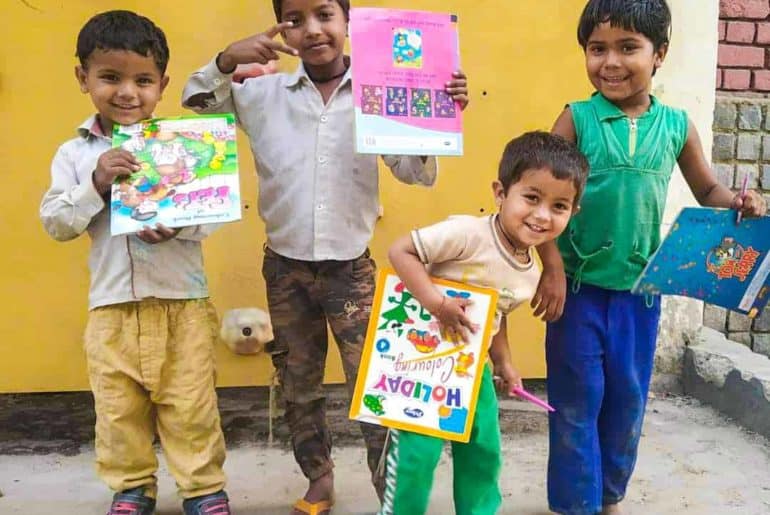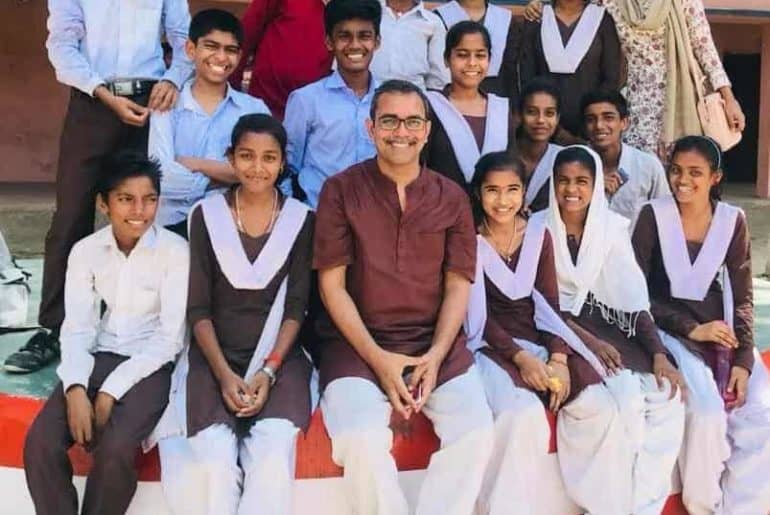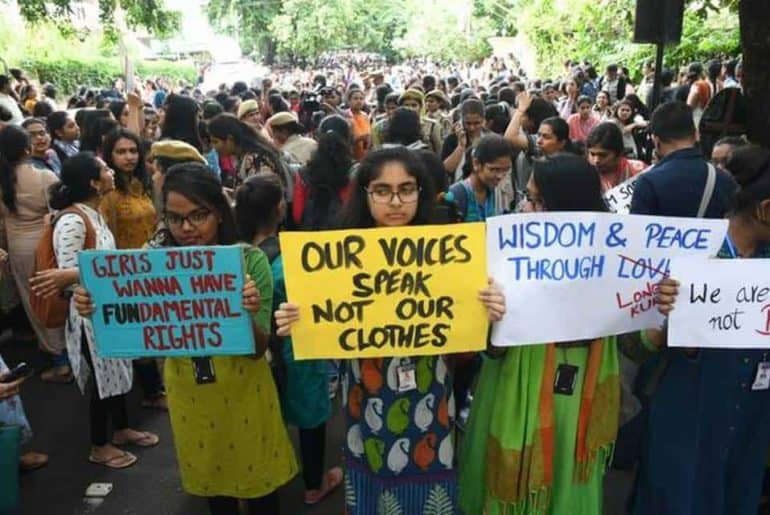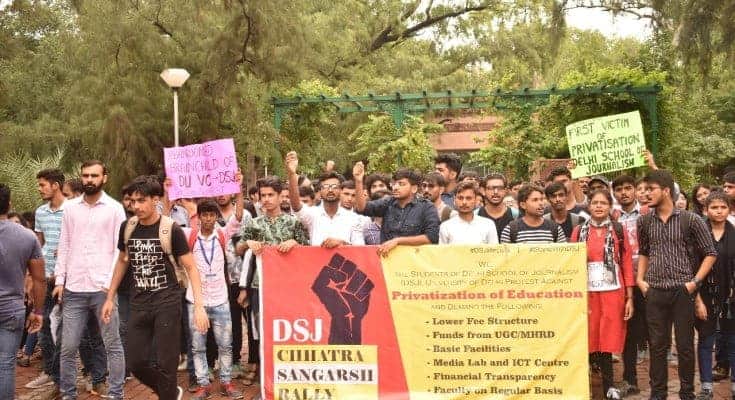DU Beat engaged in a conversation with Dr. Sanjay Kumar, India Country Director, The Lakshmi Mittal and Family South Asia Institute, Harvard University.
Priyanshu: Many students come from small towns and villages with dreams to pursue something big in life. But due to lack of exposure and good role models, they get stuck preparing for Government jobs or follow the conventional career path. As an academician and a social activist who went all the way from a small town in Bihar, Katihar, to Harvard Kennedy School, what can you suggest to these young minds?
Dr. Kumar: To begin with, it comes from parents initially. They try to condition you in a way that you should take up a particular line of action. To the students, I would like to suggest that each student is different and each human being has unique potential and, thus, they should explore that unique potential. Somehow, we believe that if the neighbour’s son is doing this, you should also be following the same. I faced this a lot. Even with my cousin brother my father used to say, “Yeh dekho CA ki padhai kar raha hai. Woh padhaai kar raha hai, usme bhi usko CA bana dete the. (Look at him, he is preparing to become a Chartered Accountant. If he is simply studying as well, then too they would make him a CA.)” It’s a wrong approach and every human being has a separate talent; and following the conventional path you do not get an opportunity to explore thing which you can explore as an individual. You don’t want to take chances in your life. At this age, I think one can definitely take chances. It is after midage that one requires security in life but early in life, one should try to discover what they are looking for. And nowadays, I am very happy to see that a few students from Delhi University are taking a break after their undergrad to explore themselves, which is a very Western concept. So, my answer to your question is: young students should explore various career paths, and career is not the end. Unfortunately, in our country everyone thinks that UPSC (Union Public Service Commission) is the goal. I am sorry to say but this is a big misconception. Being a civil servant can be a means to serve the end, but it cannot be the end. I would strongly suggest (that) the students should identify the purpose in life as early as possible. And purposes can be changed as well. It can be edited and altered. But then one can accordingly find means to serve the purpose.
Priyanshu: What opportunities does the Lakshmi Mittal and Family South Asia Institute, Harvard University, provide to young students who come from underprivileged backgrounds?
Dr. Kumar: So, since last two years, Lakshmi Mittal and Family South Asia Institute, Harvard University India office is the connector and convenor of the Harvard Programme in South Asia and it has a number of programmes but for youngsters we have a specific programme called ‘Crossroads’ where two of the Harvard faculties from Harvard Business School have come up with this idea of bringing youngsters from all over the world (it started from south Asia but now it’s all over the world) and we organise this in Dubai. It’s a fully funded programme. There are donors based out of Dubai. It’s a one-week training for students around leadership and exposing them towards the Harvard method of education and teaching. This is only for students who are first in their family to go to college. In a way, the programme is targeting underprivileged youngsters and the best thing about the programme is that all of them fly to Dubai and meet other students and teachers. (The link to apply for the programme is: https://mittalsouthasiainstitute. harvard.edu/crossroads/)
Priyanshu: You have talked about this in your book too and this concerns the nation at large as well. The decline of public education in our country is quite worrisome. Who do you blame for this? The Government or the private education ecosystem? How do you perceive this and what has your organisation, Edjustice, achieved in resolving this issue?
Dr. Kumar: It’s definitely the Government! Because the idea of privatisation comes from the Government, and the market always sees the opportunity. You cannot blame the private educators. If they see the opportunity, they will come forward. I don’t think it’s (privatisation) a good idea. For a country like India, we still need to continue with public education for 30 to 40 years, because a lot of people are still lagging behind in education and they can’t afford costly private education. The indicators are not good, and the kind of fees that the private universities charge – I am not taking about quality – not everyone can afford. What stops us to strengthen our public education system which can provide quality education? If you see, 20 years ago, all the big names were coming from public colleges. Even now, some of the big names are coming from public universities only. So, it’s just that the Government doesn’t wish to put attention on public colleges. I don’t blame the private players. I blame the Government. And, people also need to be blamed. We are not talking or protesting about it. We want the good pie in everything. For health, we want five star health-care. Our aim is to earn good money, so that we can avail good facilities and our children can go to good schools. Our aim is not to fix the system which used to exist. Take an example: when we talk about quality of air, we know that it is affecting everyone – the rich, the poor, and the middle class – everyone is harassed by air pollution. So, everyone is talking about the air pollution, but education is something which is not bothering them; no one is talking about that. So, if public education is not affecting my kid or my family, then I am not going to talk about it. But I am talking about air as it used to be very good. But then our public education also used to be very good. If we are taking about reviving or cleaning the air, why can’t we talk about reviving the public education system? So, the public is also responsible. I also wonder why students studying in DU colleges and the students’ unions do not raise the issue of high-quality teaching in colleges? Since you mentioned about my book, I would encourage students to read my book, Katihar To Kennedy: The Road Less Travelled. It depicts my life at DU and what all I gained being a DU student. It’s available on Amazon.
Priyanshu: A lot of students dream to pursue higher education from Ivy League or Russell group colleges after their graduation. The exorbitant fee and sustaining in foreign countries make scholarships a viable option. As a student who has fetched a scholarship to study in Harvard Kennedy School, can you suggest how an average student can grab one for themselves?
Dr. Kumar: For that, I think these universities look (at) leadership skills in you, how good you are at extracurricular activities, how good you are in the field you are pursuing, and what leadership role you have played. And it’s also important to let them know how your learning is going to help the humanity, at large. So, when you are writing your SOP (statement of purpose), these things matter a lot and it should come naturally. You can’t decide today that you want to apply for Harvard or Princeton, and someone suggest that you have to write an SOP and you start writing . That’s not a good thing to do. You need to start as early as possible. I don’t mean you have to start writing as early as possible, but you have to build your personality like that. You have to build your profile like that. There are a lot of scholarships available. One thing that I have observed is that if you have to go to foreign counties for higher studies and if you have the right intent, then nobody can stop you.
Priyanshu: How can a student be a part of your Edjustice People’s Campaign and contribute to the development of underprivileged children?
Dr. Kumar: So, Edjustice is a campaign to rejuvenate public education system in India. It’s an all-volunteer run campaign, so it’s quite unique. The campaign started from Bihar, but the model is quite relicable and scalable, hence we will move to other states next year. So, any student from Delhi University who wants to be a part of this education camping and believes in strengthening and rejuvenating the public education system is very much welcome to join us. For more information, one can visit www.edjustice.in and the Facebook page is @edjusticeindia and if you want to write, the e-mail ID is [email protected]. With the active volunteers, the campaign expects eight hours per week, which is mostly off-site and we have meetings every week, and that too in the evening so that it suits everyone. The volunteers also travel to field areas like Bihar once in a while, but they also support us with designing the campaign and various programmes. Volunteers can join for one year and they can always renew after that. This is a very good opportunity for young students, especially for DU students and since I come from this varsity, I feel that students are very bright in DU and they can contribute a lot. Many students from LSR (Lady Shri Ram), Hindu, and Venkateswara College are a part of this campaign.
Feature Image Credits: Mr. Sanjay Kumar
Interviewed by Priyanshu and Maumil Mehraj for DU Beat
[email protected] [email protected]
Interview transcribed by Priyanshu for DU Beat










